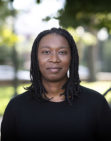Barky's
[00:00:34] Barksdale I love music when it has a good message to it. When it's not a show. Ooo boy, I don't know that I have any favorites now, man. I like very much, I like persons like, uh James Cleveland. Boy, person like that live in your heart forever. And, uh, I like Sam Cooke alright, but of the two I like, I prefer James Cleveland, best of all. Mahalia Jackson—I love her. And uh, a number of them I like.
[00:01:14] I got so old now, I can't do nothing late! But I used to, I used to stay up two, three o'clock in the morning and uh because when I first go into business I used to go and play music for people. I had a record player and I go and play music hoping that the people would hear the music and would come to the store to buy it. And some of them would. And sometime I would take a few pieces of music with me and uh stay up two and three in the morning and then get up and come to work. There no way in the world I could do that now, no-oh.
[00:01:43] I didn't realize that age takes its toll on you. Take it from me, miss, it takes its’ toll on you.
[00:01:52] The first Sunday of each month the persons having birthdays in that month stand. And I'm gonna stand and I'm gonna tell Her I'm 86 years old and thank you, thank you, thank you.
[00:02:10] My name is Barksdale Wise Haggins. I sign my signature Barksdale W. Haggins.
[00:02:17] Woman's voice in store See, when God told me to write this number in my book one day I didn't know it was gonna be the day I needed it. He said go ahead and write and your number in this book and there it is. See, God be telling you to do something. There it is. He speak to your spirit. And you gotta do it.
[00:02:42] Barksdale and customer (Illegible background chatter in shop.)
[00:03:00] Barksdale There was three other black persons decided to open a record shop. One of them used to come in regularly. He used to haul furniture for a furniture store. He used to come in every weekend and buy a record. So he decided to open up a record shop. And then there was another person in Petersburg, he decided to open a record store and he became a real friend, and was one other in Churchill. So there was three of them. So. And then when the Coliseum opened they wouldn't sell us tickets. So they got me and said, let's get together and go down there and find out why they not gonna sell us a ticket. So I got with them and went down there and went and met with the office and the people and to talk about getting the tickets and our location cause mostly a lot of the events they were bringing in were black events, and so why shouldn't we have tickets.
[00:03:59] Barksdale We left there, and those guys, and behind my back went back to the man and made arrangements so that they could get the ticket, and I didn't get 'em, and knocked me out. And I had been in business as long ... they wanted, they were trying to knock me out of business, cause I was the oldest establishment. And, uh, so I had come to find out, that I went down and they said yeah, we sell them tickets, and you ain't gettin' none. I said, well, all be darn and that's what they did, behind my back. And now, all three of them are dead. Gone. And I'm still here. That just goes to show you what happens to you when you caught doing dirt to other people.
[00:04:42] Barksdale That's the best way when you find out that people are trying to hurt you. Just laugh and pretend like you don't know anything about it. In all the time they just sticking the dagger in your back. Ha ha!
[00:05:01] Barksdale When I got out of the Army, my first day home, when I got up the next day after returning home from the Army, my father asked me, he said, what are you going to do Barky? I said I don't know. He said, why don't you open a record shop, because he had a radio repair shop three blocks up the street and he had been in business for years and, uh, he said people have been coming in asking about records. I said, okay, that's what I'll do. And so, from that day to this, that's how I got into the record business.
[00:05:39] Barksdale There were poor white-owned shops. And the strange thing is when I went up to the distributor, and letting him know that I had gotten a license and I opened a record shop, he said, well you won't be there long. Because he had this fixation in his mind that blacks when they go in business, they'll be there for just a few months or maybe a couple of years, and then they're gone. And lo and behold, I've been here for sixty-four years and all the others are gone. All of them. All those white shops are gone. And he wouldn't, when I first went up, he didn't even want to sell me the merchandise.
[00:06:22] Barksdale So I went to Baltimore, Maryland, and went to New York, and bought from suppliers there and brought it back to sell. And so he found out how determined I was, he would sell me, but he said when you come to get 'em, come here real early in the morning before the other record store buyers come in. He didn't want me up there while they were there. It just goes to show you how a person's minds are wrong!
[00:06:51] Barksdale But lo and behold, I put up for sixty-four years of it. And all of them are gone! Every one of them. I'm the only one around now (laughter). Life is interesting. It sure is.
[00:07:13] Women's voices in store (Illegible background chatter in shop.)
[00:07:49] Barksdale Between businesses subsidized from other investments that are made as I was going along, instead of relying, spending money elaborately on automobiles and other elaborate things. I was buying real estate. And so I'm using money there to subsidize this business, to keep this business going. But, we do have some dedicated customers. We have some customers who are dedicated, which is enabling us to stay also. We're blessed. I get the blessing every day. Every day I get the blessing.
[00:08:27] Barksdale Years ago we was very busy. They had trolleys running up and down this street. You used to have to stand in the street to catch the trolley, going, going east and west. And then they did away with the trolleys, took up all the tracks, took down the lines. Now they got the buses. And, uh, during that transition period, when all this transition was taking place, the white people moved out and the city became predominantly black. Was a chocolate city, and now (laugh) turning back to vanilla.
[00:09:04] Barksdale And now we sell as many church clergy shirts, more of those than we sell the music. And I don't think there's any other ways around it. You just sell them (laugh). So we are blessed there. That's what's keeping us in business longer. There's no other place around here selling that type of merchandise. And we have a couple of nice people come in and mention to us and say, we hope you never go out of business. And it's nice of them to say that. We appreciate that. And we are fortunate to have a (?) that we do. Friends. Without a heart you can't live, can you? And so she's the heart of the business. That's what's keeping the business alive.
[00:09:51] Barksdale (Reading prayer) Help us, everybody, to hold tight to You, when the turbulence of our lives gets too hard to bear. In Jesus' name we pray. Amen. That covers everything. Then another one on here: Too short to be anything but happy. Falling down is a part of life. Getting back up is living.
[00:10:25] Barksdale They were talking about, are you a preacher? Everybody's a preacher. The way you live your life, as a sermon. A sermon is a life, the way you live.
 Micah Watson
Micah Watson



